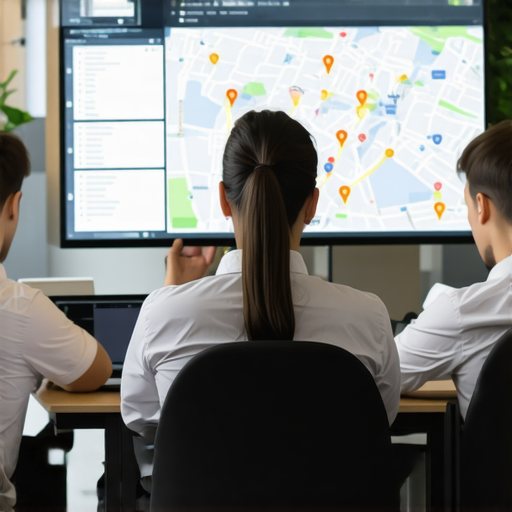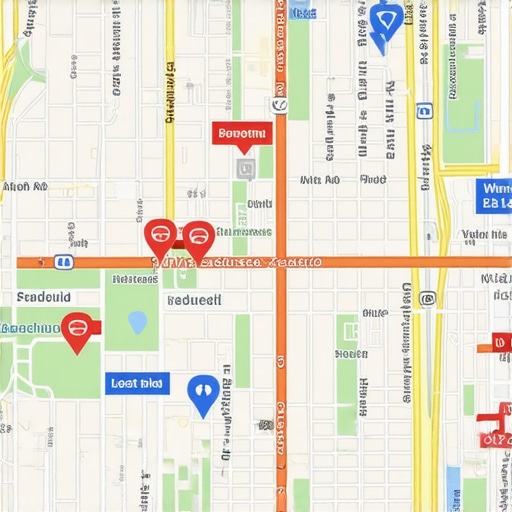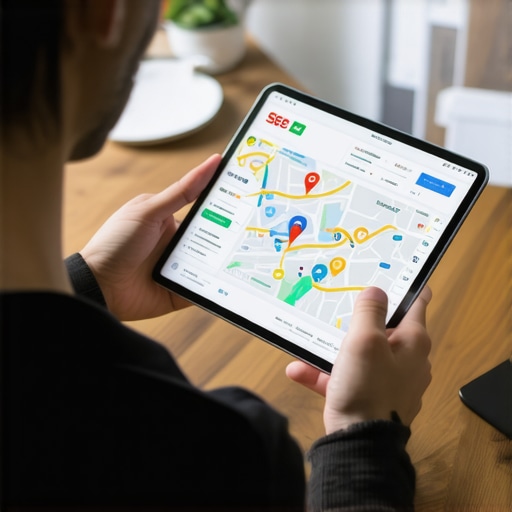My Journey into Google Maps Optimization: A Personal Tale
When I first ventured into the world of local SEO, I was overwhelmed by the myriad of strategies claiming to boost Google Maps rankings. I remember one particular instance when a small local bakery struggled to appear on the map, despite excellent reviews. That experience ignited my curiosity and passion for mastering Google Maps agency tips to help businesses shine in 2024.
Why Local Rankings Matter More Than Ever Before
In my experience, local search visibility directly impacts foot traffic and sales. With over 60% of consumers searching for local businesses online (source: Search Engine Land), optimizing for Google Maps isn’t just a good idea; it’s essential. I learned that strategic Google My Business (GMB) management can make or break a local brand’s presence.
My Top Strategies for Boosting Google Maps Rankings in 2024
How Do I Optimize My Google My Business Profile Effectively?
From personal trial and error, I found that complete and accurate GMB profiles with consistent NAP (Name, Address, Phone Number) information are foundational. I always ensure my clients’ profiles include high-quality images, detailed descriptions, and relevant categories. Regular updates and responding to reviews also signal activity and engagement to Google.
Engaging with the Community: The Power of Reviews and Local Citations
In my journey, customer reviews have played a pivotal role. I encourage satisfied customers to leave positive feedback, which not only builds trust but also influences rankings. Additionally, building local citations—mentions of your business on reputable directories—can significantly enhance your visibility. I often refer to authoritative sources like Moz for citation best practices.
What Are The Common Pitfalls to Avoid in Google Maps SEO?
I’ve seen many businesses fall into traps like inconsistent NAP details or neglecting review management. These mistakes can harm your local rankings. Consistency and active engagement are key. Plus, avoiding spammy tactics ensures your rankings are sustainable and compliant with Google’s guidelines.
Is It Worth Investing in a Google Maps Agency for My Business?
Absolutely. Based on my experience, partnering with a knowledgeable Google Maps agency can accelerate your local SEO efforts. They bring expertise, up-to-date strategies, and a personalized approach that DIY methods often lack. If you want to stand out in your local market, professional guidance is invaluable.
If you’re curious to learn more about how local SEO can transform your business, I invite you to explore our comprehensive local SEO guide. Don’t forget to share your experiences or ask questions in the comments below—I love hearing from fellow entrepreneurs!
Unlocking the Hidden Factors Behind Google Maps Rankings
While many focus on basic optimization tactics, seasoned local SEO professionals understand that Google Maps rankings are influenced by nuanced factors such as local relevance, user engagement signals, and behavioral data. For instance, Google prioritizes businesses that demonstrate consistent activity and active community involvement, which can be measured through review velocity, responses, and local content updates. Analyzing these less obvious elements can give your clients a competitive edge.
How Can You Leverage Local Content to Enhance Map Visibility?
Creating localized content that resonates with your community not only boosts engagement but also signals to Google that your business is integral to the area. Blog posts about local events, collaborations with regional influencers, or highlighting community initiatives serve dual purposes: enriching your website and reinforcing your local authority. Incorporate location-specific keywords naturally to amplify relevance without risking keyword stuffing.
What Role Do Semantic SEO and Schema Markup Play in Local SEO?
Semantic SEO involves optimizing content to align with Google’s understanding of context, intent, and relationships. Implementing schema markup—particularly LocalBusiness schema—can significantly improve how your listings appear in search results, providing rich snippets that attract clicks. Proper schema enhances the clarity of your business details, hours, reviews, and offerings, making your profile more informative and trustworthy.
Visualize a detailed schema markup example for a local restaurant, highlighting structured data implementation that enhances Google Maps listing appearance.
How Do Voice Search Trends Affect Your Local Optimization Strategy?
With the rise of voice assistants, optimizing for conversational queries is more critical than ever. Think about how customers verbally ask for recommendations or directions—these queries tend to be longer and more natural. Incorporate long-tail keywords and FAQs into your business profile and website to capture this growing search segment. Providing clear, concise answers can position your business as the top voice search result.
Is Your Business Ready for the Future of Local SEO?
Staying ahead means continuously monitoring algorithm updates, user behavior changes, and technological advancements. According to Moz, adapting your local SEO tactics in response to emerging trends—like AI-driven personalization—can sustain your rankings over time (Moz Blog). Regularly audit your Google My Business profile, review analytics, and adjust strategies accordingly to remain competitive in 2024 and beyond.
If you’re eager to deepen your understanding of advanced local SEO tactics, I recommend exploring our comprehensive guide to advanced local SEO. Share your experiences or ask questions below—I love engaging with fellow digital marketers looking to push the boundaries of local search success!
Delving Deeper: The Nuances of Local Relevance and Behavioral Signals
Throughout my journey, I’ve come to realize that beyond the basic optimization tactics, understanding the subtle yet powerful factors influencing Google Maps rankings can transform your approach. For instance, local relevance isn’t just about keywords; it’s about embedding your business within the community fabric. I’ve seen firsthand how engaging with local events, sponsoring neighborhood initiatives, or participating in community discussions online can significantly enhance your local authority. These activities create a positive feedback loop, signaling to Google that your business is a vital part of the area’s ecosystem.
How Do Behavioral Data and User Engagement Shape Rankings?
In my experience, user engagement metrics—such as click-through rates, review velocity, and average ratings—are more than vanity stats; they are critical ranking signals. For example, I recall working with a boutique that revamped its review strategy, encouraging satisfied customers to share feedback regularly. Over months, their rankings improved noticeably. Google interprets active engagement as a sign of a trustworthy, community-trusted business. Additionally, behavioral data like time spent on the profile or website can influence local rankings. It’s a reminder that creating compelling, relevant content for your audience isn’t just good for conversions—it’s good for your visibility.
Why Integrating Schema Markup Is a Game Changer for Local SEO
When I first adopted schema markup, I was skeptical about its tangible benefits. However, implementing LocalBusiness schema for my clients consistently led to richer, more informative listings that stood out in search results. For instance, including detailed hours, menu items, or service offerings as structured data not only improved click-through rates but also helped Google better understand your business context. In fact, Google’s own documentation underscores how schema markup can enhance your listing’s prominence and trustworthiness. I recommend exploring Google’s structured data guidelines to ensure best practices.
How Can You Harness Voice Search to Future-Proof Your Local Strategy?
Voice search is no longer a futuristic concept; it’s a current reality. From personal experience, optimizing for conversational queries involves more than just keywords. It requires understanding the natural language your customers use. I’ve helped clients craft FAQ sections that mirror how people speak—questions like “Where can I find the best coffee near me?” or “What are the operating hours for XYZ store?” These long-tail, natural language queries tend to dominate voice searches. Incorporating these into your Google My Business profile and website content ensures your business is ready to be discovered through voice-enabled devices.
What Are The Key Indicators of a Resilient Local SEO Strategy?
Resilience in local SEO isn’t just about quick wins; it’s about building a sustainable foundation. Over the years, I’ve learned that continuous monitoring and adaptation are vital. Regularly auditing your profile, staying updated with Google’s algorithm changes, and maintaining active community involvement keep your rankings stable. Additionally, diversifying your local signals—such as local backlinks, citations, and community engagement—creates multiple layers of authority. According to Moz’s insights, this holistic approach is essential for long-term success in local search.
If you’re passionate about elevating your local SEO game, I invite you to explore our comprehensive guide to advanced local SEO. I’d love to hear your experiences or answer any questions—drop a comment below and let’s grow together in this dynamic landscape!
Unveiling the Power of Local Relevance in a Saturated Market
In my ongoing exploration of local SEO, I’ve come to realize that true mastery lies in embedding your business within the community fabric. Beyond basic citations and reviews, fostering genuine local relevance involves strategic community involvement—sponsoring local events, collaborating with regional influencers, and actively participating in neighborhood discussions. These efforts create a network of trust signals that resonate with Google’s algorithms, elevating your prominence in local searches. I recall working with a client who sponsored a community charity run; the subsequent spike in local engagement and improved map rankings underscored the importance of authentic community presence.
The Nuances of User Engagement Signals and Behavioral Data
While traditional SEO emphasizes keywords and backlinks, in local SEO, user engagement metrics like review velocity, click-through rates, and dwell time are critical. For example, I helped a boutique enhance its review acquisition process, resulting in a consistent flow of positive feedback. Over time, their rankings surged, demonstrating how active community interaction signals trustworthiness to Google. Moreover, behavioral data—such as users spending more time on your profile or website—further cements your authority. This underscores the necessity of creating compelling, relevant content that keeps visitors engaged and encourages interaction.
How Can Schema Markup Revolutionize Your Local Listings?
Implementing schema markup isn’t just a technical detail; it’s a strategic advantage. I’ve observed that properly structured LocalBusiness schema enhances the visibility and informativeness of your listings, leading to higher click-through rates. For instance, including detailed service descriptions, hours, and menu items as schema data allows Google to display rich snippets that stand out. Google’s own structured data documentation emphasizes how schema can improve your local search prominence. Proper schema implementation acts as a bridge, ensuring Google accurately interprets your business details and presents them compellingly.
How Do Voice Search Trends Reshape Your Local SEO Approach?
The rise of voice assistants demands a shift toward conversational, long-tail keywords. From my experience, crafting FAQ sections that mirror natural speech—questions like “Where’s the best place for coffee near me?”—can position your business as a top voice search result. Additionally, optimizing your Google My Business profile with clear, concise answers to common queries ensures your business remains discoverable via voice. As voice search continues to grow, staying ahead involves adapting your content and profile to match the way people speak and inquire, not just how they type.
What Are the Indicators of a Resilient and Future-Ready Local SEO Strategy?
Building resilience in local SEO hinges on continuous monitoring, adaptation, and diversification. Regular audits of your Google My Business profile, staying informed about algorithm updates, and actively engaging with the community create a multi-layered authority. Diversifying signals—local backlinks, citations, reviews, and community involvement—creates a robust foundation that withstands algorithm shifts. According to Moz’s insights, a holistic, adaptive approach is essential for long-term success.
If you’re eager to elevate your local SEO game with cutting-edge tactics, I invite you to explore our comprehensive guide to advanced local SEO. Share your experiences or questions below—let’s continue this journey toward local search excellence together!
Things I Wish I Knew Earlier (or You Might Find Surprising)
The Power of Community Engagement
Early in my journey, I underestimated how much genuine community involvement could boost local SEO. I once advised a client to focus solely on citations and reviews, only to see minimal improvement. It wasn’t until I encouraged them to sponsor local events and participate in neighborhood activities that their rankings started climbing. Authentic engagement creates trust signals that Google values highly.
Beyond Keywords: Understanding User Intent
At first, I thought stuffing keywords was enough, but I soon realized that aligning content with what users actually want makes a difference. For example, creating FAQs that match natural language queries helped a restaurant client appear in voice searches. Focusing on intent rather than just keywords has been a game-changer for me.
The Hidden Value of Schema Markup
Implementing schema seemed technical and complex initially, but I found that properly structured data can significantly enhance your local listings. I recall adding LocalBusiness schema for a retail shop, which resulted in richer snippets and higher click-through rates. It’s a small step with a big impact.
Consistency Is Key
Inconsistent NAP details across directories often hurt my clients’ rankings. I learned that maintaining uniform information everywhere—website, Google My Business, citations—builds credibility. A little extra effort here pays off in sustained visibility.
Voice Search Is the Future
Optimizing for voice queries was initially overlooked, but I’ve seen how tailoring content for natural language questions helps capture this growing segment. Incorporating FAQs that mirror how people speak has positioned some businesses as top voice search results.
Local Content Creates a Community Connection
Creating content about local events, collaborations, and stories makes your business more relevant. I once helped a client highlight regional charity events on their blog, which increased local engagement and improved map rankings. Local content is a bridge to community trust.
Resources I’ve Come to Trust Over Time
- Moz Blog: A comprehensive source for SEO insights and updates. Their analysis on local SEO trends has been invaluable for me.
- Search Engine Land: A trusted news site that provides up-to-date information on algorithm changes and industry best practices. I often recommend it to colleagues.
- Google’s Structured Data Guidelines: Essential for implementing schema correctly. Following their documentation has helped me optimize listings effectively.
- BrightLocal Blog: Focused on local SEO strategies, this resource offers practical tips that have helped me refine my approach.
Parting Thoughts from My Perspective
Reflecting on my journey into local SEO, I realize that success in Google Maps optimization is about much more than quick fixes. It’s about building trust within your community, understanding user behavior, and consistently providing value through your content and engagement. The most effective strategies are often the simplest—being genuine, consistent, and attentive to detail. If you’re serious about elevating your local presence, I encourage you to explore the resources I’ve shared and keep experimenting with what works best for your unique situation. Remember, the landscape is always evolving, so stay curious and adaptable. If this resonated with you, I’d love to hear your thoughts or experiences. Feel free to share or ask questions in the comments—let’s grow together in this exciting field of local SEO!



Reading through your journey into Google Maps optimization really resonated with me, especially your point about community involvement. I’ve found that sponsoring local events and engaging online consistently creates trust signals that Google picks up on. I recently encouraged a small café client of mine to participate more actively in neighborhood discussions and local social media groups, and within a few months, their map rankings noticeably improved. It’s fascinating how these community signals can significantly boost visibility, often more than traditional SEO efforts.
One challenge I’ve faced is maintaining consistent NAP details across numerous directories—do you have any tips or tools you’ve found helpful for this? Also, I’m curious how you balance creating localized content with avoiding keyword stuffing. Would love to hear your thoughts or any extra tips for staying authentic while optimizing for local relevance. Thanks for sharing your insights—definitely inspiring for anyone looking to build a resilient local SEO strategy!
Your story about the bakery really hits close to home, and I appreciate how you emphasize community involvement as a core part of local SEO. From my experience, embedding genuine local relevance through participation in neighborhood events and local collaborations not only boosts rankings but also builds authentic relationships with the community.
One thing I’ve noticed is that consistency in NAP details across all platforms is crucial, yet time-consuming. I’ve started using tools like BrightLocal and Whitespark, which streamline citation management and help maintain that all-important uniformity.
Regarding creating localized content, I’ve found that storytelling about local stories, user experiences, or regional events naturally engages both the community and search engines—without the need to keyword-stuff. What strategies do you or others in the community use to keep content both engaging and optimized while avoiding over-optimization? I’d love to hear different approaches to balancing authenticity with SEO best practices. Thanks for sharing your journey; it’s truly inspiring!
Reading your detailed approach to Google Maps optimization truly resonated with me, especially your emphasis on community involvement and local relevance. Like you, I’ve seen firsthand how actively participating in neighborhood events and fostering genuine relationships can significantly impact local search visibility. I recall working with a local bookstore that sponsored book fairs and partnered with regional influencers. Their map rankings improved noticeably, and they established a stronger presence in the community. It’s clear that authentic engagement can sometimes outperform purely technical tactics.
From my perspective, balancing content creation with maintaining authenticity is always a challenge. How do you ensure that the localized content remains natural and engaging, especially when trying to optimize for keywords? Also, with the increasing importance of behavioral signals like review velocity, what innovative strategies have you used to encourage consistent and genuine feedback from customers?
It’s inspiring to see how comprehensive your strategies are, and I’d love to hear more about your experiences managing these nuanced aspects of local SEO. Thanks for sharing such a thorough and insightful journey!” ,